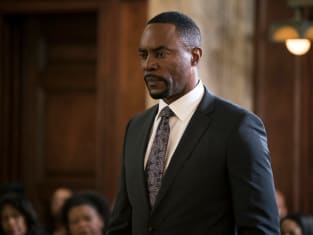Chicago Justice Season 1 Episode 2 Review: Uncertainty Principle
 Jack Ori
at
.
Updated at
.
Jack Ori
at
.
Updated at
.
It usually takes me a little while to get into a new show, but Chicago Justice has already won me over.
Chicago Justice Season 1 Episode 2 had everything I love most.
Characters I already know and love working alongside ones that I can't wait to get to know better, a compelling story, courtroom drama, and controversial social issues that the writers aren't afraid to dive into deeply.
From the moment Antonio joined the State Attorney's office, a conflict between his old job and his new one was inevitable, and there couldn't have been one more perfect.
Antonio's loyalties were divided not only because the SA's office was going up against Voight's unit but because Atwater is probably one of the best cops in that unit. While Voight tends to encourage the use of violence as a means to an end, Atwater is pretty much a straight shooter.
For that reason, Antonio wasn't the only one conflicted. I was rooting for Atwater even though I wanted to get to the bottom of what happened and get justice for the Wilkes family.
Stone: It's Voight's unit. They aren't exactly shrinking violets.
Antonio: That's bull.
Stone: I get no pleasure out of going after a cop, especially Kevin Atwater.
Antonio: Then drop it.
Stone: My obligation is to the victim and their family. I can't just drop him.
Stone and Antonio clearly have opposite priorities, and that's not likely to change anytime soon. Antonio's first loyalty is always going to be Voight and the rest of his old unit, and it'll be interesting to see how that plays out.
It didn't help that Voight's unit has a reputation for violence and Voight's contribution to the investigation was to opine that if Atwater killed Wilkes, Wilkes deserved it.
Both Stone and Antonio were right and wrong.
Stone was under a lot of pressure from Jeffries to avoid the appearance of favoritism or shielding cops from the consequences of bad behavior, and he was just as overzealous in the pursuit of that goal as Antonio was in his efforts to protect Atwater.
Atwater: You want me to say it's okay, you tried your best, Antonio? Nothing makes this okay. I got a badge, I'm guilty. Simple as that.
Antonio: You don't know that.
Atwater: I saw a black woman get up and testify against me today, looking at me like I turned my back on my people. My people whose history includes fire hoses being turned against them, being shut out of restaurants and schools, being lynched. This isn't what I became a cop for.
Antonio and Atwater's friendship took a huge hit as a result of this whole mess, and it remains to be seen if it can ever really be fixed.
Atwater's arrest scene was a powerful reminder of just what was at stake. Antonio showed up to wordlessly arrest Atwater, and Trudy gave him a disapproving look as they passed her on the way out of the building.
The lack of dialogue said much more than any words ever could.
Robinette: Have you ever been arrested?
Stone: Objection. Relevance.
Robinette: Goes to credibility, your Honor.
Judge: I'll allow it.
Witness: No, I have never been arrested.
Robinette: Has anyone in your family ever been arrested?
Stone: Objection!
Judge: Overruled.
Witness: Yes. My brother James. He was on the El.
Robinette: What was your brother James doing on the El?
Witness: They said he was disturbing the peace. His teacher had given him a ticket to United to see the Bulls. I guess a black man sitting on the El disturbed some people.
Throughout the hour, Chicago Justice took the opportunity to explore issues of racism in policing without being heavy handed or preachy.
The choice of Atwater, an African American cop, as the cop on trial for excessive force was an interesting one.
Most crime dramas tackle the issue of white cops shooting unarmed black suspects, but "Uncertainty Principle" went in a more interesting direction.
For one thing, Atwater's problem was far more realistic.
There was no dramatic shootout or question of whether an unarmed suspect drew a gun or not. Instead, Atwater did what he thought he had to in order to subdue a resistant suspect and was left questioning whether he went too far.
This felt to me like something that happens far more often to real cops, and its relative uniqueness on television made it more interesting.
In addition, the pressures and difficulties black cops face are different than those white cops face, especially when it comes to conflicts with black suspects.
Atwater: You want me to say it's okay, you tried your best, Antonio? Nothing makes this okay. I got a badge, I'm guilty. Simple as that.
Antonio: You don't know that.
Atwater: I saw a black woman get up and testify against me today, looking at me like I turned my back on my people. My people whose history includes fire hoses being turned against them, being shut out of restaurants and schools, being lynched. This isn't what I became a cop for.
Atwater's description of how he felt as if he were being seen as a traitor to his community and was now the oppressor rather than the oppressed was one of the best moments in "Uncertainty Principle."
It was realistic and raw and was done in the context of a basketball game between two members of the justice system who suddenly found themselves on opposite sides.
When Atwater decided to take a plea soon afterwards, I wondered whether Wilkes' mother would have been equally satisfied with his attempt to take responsibility for his actions if he had been a white cop who had killed her son.
It also reminded me of how many people, many of them poor and/or black, plead out even if they are not guilty because they just can't continue to fight for one reason or another.
He's just a guy, you know? Worse than some, better than most. So tell me, what kind of prick goes out of his way to ruin a good person's life like that?
Antonio
I had mixed feelings about the 11th hour discovery that Atwater couldn't have been guilty for this reason.
I didn't want Atwater to go to jail for something he might not have done, and I felt vindicated by his exoneration, but it felt somewhat convenient.
Sure, questions had come up before about whether Wilkes was drunk but for Antonio to discover new evidence that suggested Atwater was innocent right after he'd been sentenced was a little bit too easy.
Plus, in real life wrongly convicted persons rarely get justice 30 seconds after they were sentenced, and victims' families might object strenuously to a conviction being vacated.
Stone's apology was a nice touch that I wished occurred more often in the real world, too.
Laura: You know what would be nice? If my partner and I were on the same page.
Antonio: I worked with Kevin Atwater. He was my partner.
Laura: I'm your partner now.
Obviously, Antonio's divided loyalties aren't going to resolve themselves in an hour, but I was glad to see him settling into his partnership with Laura.
Laura, for her part, was able to be empathetic once Atwater pled out rather than focusing solely on justice being served. This bodes well for their future relationship, and I'm very interested in how it will evolve.
Meanwhile, I'd also like to see more of Robinette and Stone's relationship. I love it when there are some personal stories mixed in with all the legal drama, and this was no exception.
I want to see exactly what the story is with Stone's father, and I was wondering if Stone and Robinette somehow shared a father. I could be way off base, but that's just a vibe I got.
In any case, Stone calling his father at the end of the hour means that there's more of his backstory to come, hopefully soon.
What did you think of "Uncertainty Principle"? Do you think Atwater and Antonio's friendship can ever heal? Will Antonio's loyalties ever shift, and should they?
Weigh in below, and don't forget if you missed anything you can always watch Chicago Justice online.
Jack Ori is a senior staff writer for TV Fanatic. His debut young adult novel, Reinventing Hannah, is available on Amazon. Follow him on X.




